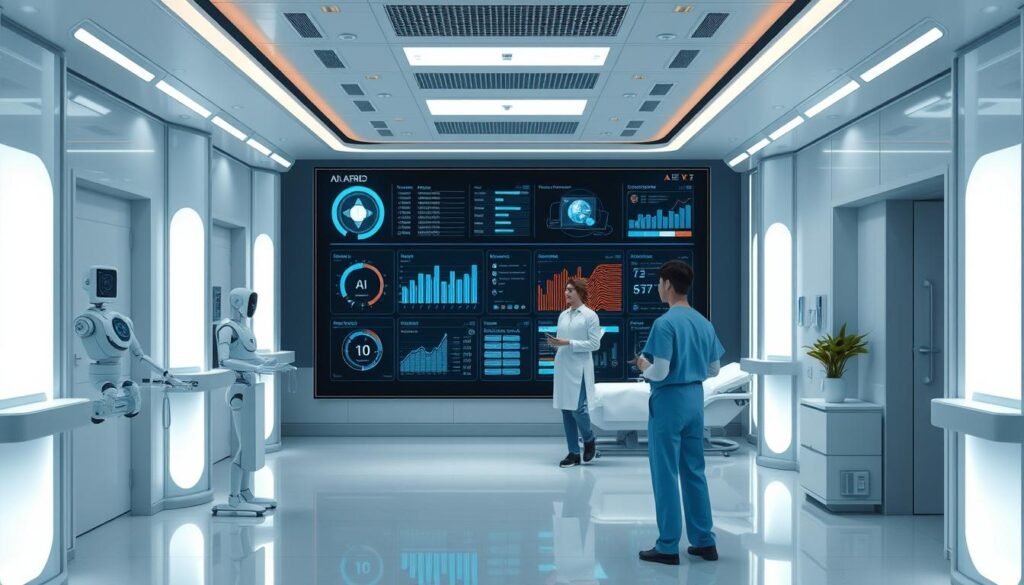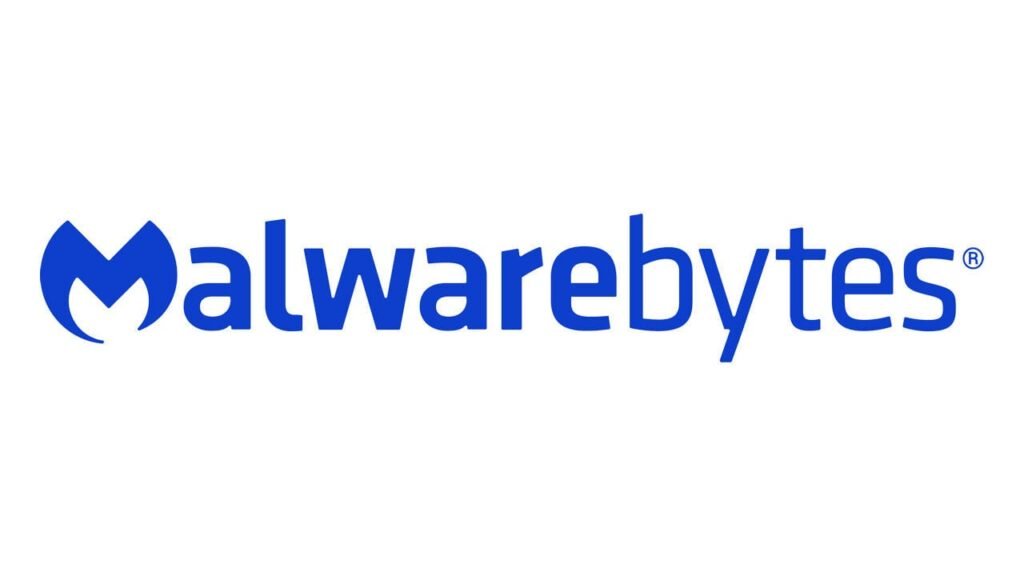Did you know that by 2030, the global healthcare industry could face a huge shortage of nearly 18 million healthcare workers? This includes 5 million fewer doctors than needed1. This challenge shows how important new solutions like artificial intelligence (AI) are. AI is changing healthcare by making it more efficient, accurate, and better for patients.
AI is not just a future idea; it's already changing healthcare today. It's making a big difference in diagnostics, patient care, and making things run smoother. You might be surprised to hear that AI-assisted hospitals have seen a 12% increase in admissions for serious conditions like Intracranial Hemorrhage2. This shows how big of an impact AI is having on healthcare.
As we look at the benefits of using AI in healthcare, it's clear that it's making things better. It's helping patients have better experiences and outcomes by using data to make decisions.
Key Takeaways
- AI is essential for addressing the looming shortage of healthcare professionals.
- Artificial intelligence healthcare benefits include enhanced patient outcomes and streamlined clinical workflows.
- The adoption of AI technology in healthcare is leading to significant improvements in patient retention and admissions.
- AI has the potential to minimize healthcare costs while promoting better resource allocation.
- Healthcare systems utilizing AI can experience reduced staff burnout and improved communication among teams.
- AI assists in more efficient treatment decisions, contributing to an overall better patient experience.
The Current Landscape of AI in Healthcare
Technology has changed healthcare fast, with AI leading the way. Innovations like machine learning and deep learning are changing how care is given. These tools help doctors do complex tasks better, improving patient care.
Overview of AI Technologies Used in Healthcare
AI in healthcare uses many technologies, like machine learning and neural networks. These tools help find important insights in big data. They make diagnosing diseases with X-rays and MRIs more accurate and quick3.
Automatic speech recognition also helps by quickly transcribing medical documents. This boosts how well healthcare teams work together3.
How AI is Reshaping Patient Care
AI is changing patient care in big ways. It helps create treatment plans that fit each patient better and makes diagnoses faster. AI can look at lots of data to help doctors make better choices, improving care quality4.
AI also helps teams work together better by managing data well. This makes patients happier with their care5.
| AI Technology | Application in Healthcare | Benefits |
|---|---|---|
| Machine Learning | Analyzing patient data | Improved diagnostic accuracy |
| Deep Learning | Medical imaging interpretation | Faster diagnosis |
| Natural Language Processing | Transcribing notes | Streamlined documentation |
| Neural Networks | Identifying patterns in data | Enhanced treatment personalization |
AI in healthcare makes things easier for doctors and patients. It helps the healthcare world grow, leading to better treatments and care for everyone3.
Enhancing Diagnostic Accuracy with AI
In today's fast-changing healthcare world, AI is changing how we diagnose diseases. It makes medical imaging more precise, leading to better patient care. AI can look through huge amounts of data, changing how we find and treat diseases.
Rapid Analysis of Medical Imaging
AI is key in quickly checking medical images like X-rays and MRIs. Special algorithms, like convolutional neural networks, help doctors spot problems they might miss. This makes diagnosis faster and more accurate, which is crucial in emergencies67.
Using AI in medical imaging also makes things run smoother. It cuts down the wait time for patients to get their results. This is a big plus for the healthcare industry.
Case Studies Demonstrating Improved Diagnoses
Many studies show AI's power in healthcare. For example, a study between University College London and Moorfields Eye Hospital found AI's 94% accuracy in eye disease diagnosis7. Aidoc's AI helped increase patient admissions for serious conditions by 12%, showing AI's role in spotting diseases6.
Another study at Envision Healthcare found a 16% drop in pulmonary embolism admissions. This shows AI's big impact on diagnosis and patient care in real life8. These examples prove AI's value in making healthcare diagnostics better.
Benefits of Integrating AI in Healthcare
AI in healthcare brings many benefits, like better patient care and team work. These benefits of AI technology in healthcare change the healthcare world in big ways.
Improving Patient Outcomes and Reducing Length of Stay
AI is great at managing data and predicting health issues. It helps sort patients quickly, which is key. Studies show AI can cut hospital stays by up to 50% for some conditions9.
This leads to better health for patients and saves money10.
Enhancing Communication in Healthcare Teams
The importance of AI in healthcare also shows in team communication. AI helps teams share info in real time, which is vital for patient care. With AI, 83% of patients say they get better care because of clear communication10.
| Benefit | Description | Impact |
|---|---|---|
| Improved Patient Outcomes | Use of AI in triage and diagnostics. | Reduces length of hospital stays. |
| Better Communication | Real-time data sharing among healthcare teams. | Enhances patient satisfaction and care coordination. |
| Cost Reduction | Lower treatment costs through efficient resource allocation. | Making healthcare more accessible. |
As AI use grows, the advantages of AI in the healthcare industry will be clear. It will make healthcare more focused on patients and efficient.
“AI can facilitate the gathering and sharing of healthcare data, aiding in patient data tracking and management.”
To learn more about AI in healthcare, check out studies on AI applications in the healthcare910.
AI's Role in Administrative Efficiency
In healthcare, using AI is not just a trend. It's a key step to improve how things work. AI helps healthcare providers do their jobs better, making patient care even more effective.
Streamlining Administrative Tasks
AI tools are great for making administrative tasks easier. This lets healthcare workers spend more time on what matters most: helping patients. AI handles tasks like billing and record keeping, cutting down on errors and saving time.
This leads to better operations and more benefits from using AI in healthcare.
Automation of Scheduling and Documentation
AI changes how we schedule appointments and handle documents. It makes booking and reminders easier, so no one is forgotten. This means staff can work more efficiently, saving time and money11.
| Task | Traditional Method | AI-Driven Approach |
|---|---|---|
| Billing | Manual entry and reconciliation | Automates calculations and submissions |
| Record Management | Paper-based and digital disruption | Streamlines data entry and retrieval |
| Patient Scheduling | Phone calls and paper calendars | Online booking with real-time availability |
| Documentation | Manual note-taking | Speech recognition and electronic forms |
By using AI healthcare solutions, healthcare places can work more efficiently. This also means better care for patients12.
AI in Personalized Medicine
Artificial Intelligence is changing personalized medicine. It helps doctors create treatment plans that fit each patient's needs. This use of AI makes treatments more accurate and effective.
Facilitating Tailored Treatment Plans
AI helps doctors make treatment plans that are just right for each patient. It looks at genetic, biochemical, and physiological data. This way, AI can make plans that are very accurate13.
AI considers things like lifestyle, medical history, and genetics. It finds patterns that might be missed. This leads to better health outcomes13. It makes care more personal, which improves patient satisfaction.
Using Data to Guide Clinical Decisions
AI is great at handling big data. It helps doctors make better decisions. It looks at genomic data to find genetic variations that affect disease or treatment13.
AI keeps learning from patient responses. It makes treatment plans better over time. This allows for quick changes to care, making it more effective13. It shows how AI helps doctors make better diagnoses and treatments.
Reducing Healthcare Costs with AI Solutions
AI in healthcare offers many benefits, especially in cutting costs. It helps manage resources better, which is good for a healthcare organization's finances.
Efficient Resource Allocation
AI looks at patient data to plan better. This means less money wasted. In the U.S., about a quarter of healthcare spending is unnecessary14.
AI makes healthcare more efficient. It helps focus on what's really needed. This leads to better care and less cost for everyone.
Minimizing Waste and Improving Efficiency
AI finds and fixes unnecessary steps in healthcare. It's very good at spotting problems, like brain hemorrhages and osteoporosis14. This means only the right treatments are given, saving money.
AI also speeds up finding new drugs. It looks at huge amounts of data quickly. This makes drugs more affordable14.
Using AI in healthcare makes things run smoother and saves money. It's changing the healthcare industry for the better. As healthcare costs keep going up, AI will be key to a sustainable system.
AI’s Impact on Reducing Staff Burnout
In the fast-paced world of healthcare, AI is a key asset in addressing staff burnout. Burnout among healthcare professionals is a growing concern. Studies show that many nurses plan to leave their jobs due to too much work. McKinsey’s nursing survey found that 31% of nurses want to leave15.
This trend shows we need effective strategies to reduce stress on healthcare teams.
Triage and Resource Optimization
AI in healthcare improves triage and resource allocation. It makes tasks like data entry and scheduling easier. This lets healthcare workers focus more on patient care16.
With a predicted shortage of over 3 million healthcare workers by 2026, AI is crucial. It helps meet the growing demand by making workflows more efficient15.
This focus on efficiency can change how care is delivered. It helps teams focus on the most critical cases.
Supporting Healthcare Workers
AI tools not only make operations more efficient but also support healthcare workers. Digital scribes have shown they can improve documentation by almost 2.7-fold15. This means less time spent on paperwork.
AI also provides insights and reminders. These help healthcare professionals manage their tasks better. This leads to a healthier work environment.
This empowered workforce can handle challenges better. They have better patient interactions and stay well themselves. With rising healthcare costs and fewer resources, AI is key to solving these problems.
By using AI, the healthcare sector can reduce burnout. It can increase job satisfaction and keep care standards high16.
Overcoming Challenges in AI Implementation
AI in healthcare brings many benefits but also faces big challenges. A major issue is data privacy and ethics. Patient data is very sensitive and must follow strict rules like HIPAA to keep it safe. If these rules are not followed, healthcare groups could face serious problems.
Data Privacy and Ethical Considerations
AI in healthcare also raises ethical questions like informed consent and bias. It's important for healthcare providers to use AI wisely. For example, Clearstep's AI is tested thoroughly to avoid bias and ensure fair care17. This careful testing helps reassure patients and doctors about AI's fairness.
Addressing Trust and Reliability in AI Decisions
Trust in AI is key for its success. Doctors might doubt AI's accuracy or transparency. Yet, 33% of healthcare groups use Generative AI in their work18. By checking AI systems well, healthcare can build trust in them. Training programs and clear rules can also help doctors and AI work better together.
| Challenge | Description |
|---|---|
| Data Privacy | Ensuring compliance with regulations like HIPAA to protect sensitive patient information. |
| Ethical Considerations | Addressing issues of informed consent and the potential for biased algorithms in AI. |
| Trust | Overcoming clinician hesitance towards AI recommendations due to concerns over accuracy. |
| Interoperability | Integrating AI into existing healthcare systems to enable seamless data exchange. |
| Bias Mitigation | Continuously validating AI algorithms to ensure equitable healthcare delivery. |
The AI healthcare market is expected to hit $188 billion by 203019. This shows the need and chance for new ideas. With a healthcare worker shortage looming, using AI wisely is more urgent than ever19.
Future Trends in Artificial Intelligence in Healthcare
The healthcare sector is on the verge of big changes thanks to AI. New AI technologies will change how healthcare works. They will make diagnosing diseases better and tailor treatments to each patient.
Predicted Developments in AI Technology
AI is changing how we predict and manage diseases. It makes diagnosing more accurate and efficient. For example, AI improves CT and MR scans, helping doctors spot diseases like lung cancer early.
AI also helps create treatment plans that fit each patient's needs. This is especially true in cancer care, where AI looks at a patient's history, genes, and lifestyle.
Expanding Use Cases in Healthcare Settings
More healthcare places are using AI, which means better care for patients. AI can handle administrative tasks, manage resources, and predict when medical equipment needs maintenance. This keeps care flowing smoothly.
AI is also making healthcare more accessible. It helps with telemedicine, remote monitoring, and talking directly with patients. This lowers costs and keeps care quality high. For example, AI can quickly sort out who needs medical help, making healthcare more efficient.
AI is getting better at diagnosing diseases like cancer and heart problems from medical images. Cloud-based AI tools help monitor patients and tailor treatments. These advancements improve care and make AI key to healthcare's future.
Conclusion
Integrating AI in healthcare brings many benefits. It makes healthcare more efficient and focused on the patient. AI improves diagnosis, leading to better patient care. It also helps reduce waste in healthcare, saving billions of dollars each year20.
AI helps tailor treatments to each patient's needs. This shows how AI can greatly improve healthcare. It makes medicine more personal and effective.
AI is also key in reducing stress for healthcare workers. Over half of doctors say AI helps them manage stress. During tough times, like the COVID-19 pandemic, AI has proven its worth. It helps predict outbreaks and manage resources21.
AI makes administrative tasks easier, reducing errors and boosting efficiency. This is crucial for a healthier work environment. It helps healthcare professionals work better and feel less stressed.
Despite challenges, we can make AI in healthcare work better. We just need to keep working on ethics and strategies. This will lead to better technology and a better experience for everyone in healthcare22.
As we move forward with AI, we'll see better health outcomes. Patients will be more involved in their care. This is the future of healthcare, and it's exciting.







